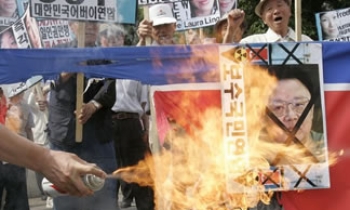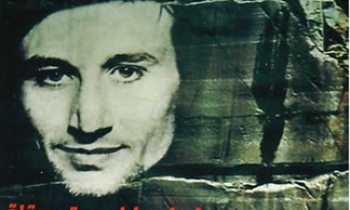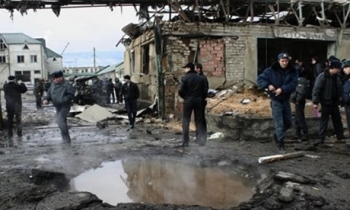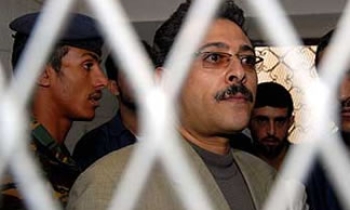Press freedom in Tunisia is going thorough one of its worst phases. There have been blatant attempt to silence subversive voices through censorship and intimidation. Judicial courts are appallingly used to infringe on the fundamental human right to freedom of expression, enshrined in Article 19 of the International Covenant on Civil and Political Rights (ICCPR), which Tunisia has both signed and ratified.

Tunisian lawyer and human rights activist, Mohammed Abbou was charged for criticising President Ben Ali in an article posted on the Internet and was sentenced three-and-a-half year imprisonment. When released from prison on July 24, 2007, he was "banned from travelling." He was told he could not leave the country when he went to Tunis-Carthage airport to travel to London. He had to fly for an interview in Al-Jazeera's London studios for a programme on free expression and human rights. Abbou said there are no legal grounds for such a ban.
In another case, journalist Abdallah Zouari was forced to continue his extended internal exile for his former work with al Fajr, the official newspaper of the Islamist movement Ennahda. As Zouari reached Tunis on June 5, 2007, the date on which his internal exile was supposed to end. However, an extra 26 months were added to his banishment without any justification. Zouari was unable to obtain any explanation from the police chief in Zarzis, where he is under close surveillance, while his wife and five children live in Tunis where he was arrested. The police chief simply told him that his orders came "from above."
Members and partners of the International Freedom of Expression Exchange (IFEX) gathered in Montevideo, Uruguay earlier this month and called upon the Tunisian government to allow Mohammed Abbou to travel freely and Zouari’s forced exile away from his family.
On the October 1, Tunisian courts ordered to expel the officially acknowledged opposition party the Tunisian Progressive Democratic Party (PDP) and the PDP's official newspaper Al-Mawkef from their premises. The weekly newspaper had been stationed in its headquarters for 13 years and has suffered repeated and frequent harassment from Tunisian authorities.
The Director of Al-Mawkef, Nejib Chebbi, and the Secretary-General of the PDP, Maya Jribi, have been on hunger strike since September 20. The hunger strike was initiated in protest to the authorities' use of the judicial system to "silence the voices of freedom."
Lotfi Hajji, the correspondent of the Qatar-based satellite TV news station Al-Jazeera, was manhandled by police as he attempted to report on the hunger strike. The incidents took place on each of the four occasions that Hajji went to the headquarters of PDP to report. He was allowed to enter the party's office on only one of the four occasions. The other three times he was forcibly removed by the plainclothes police stationed outside.
As the press freedom organisation reported, Hajji has never been allowed to work freely. After refusing to issue him with a press card and banning him from opening an Al-Jazeera bureau in Tunis, the authorities are now making frequent use of force to censor this independent journalist. According to Hajji, such incidents are common in Tunisia.
In January 2007,Tunisian authorities arbitrarily impeded next issue of a new weekly magazine, L'Expression, and banned French magazine Historia Thématique.
According to reports, the first issue of L'Expression, published by Dar Assabah, was scheduled to appear on January 5. However, despite first being told by the government that the magazine would be permitted, shortly before publication of the first issue, the authorities ordered Dar Assabah not to publish the magazine.
In early January, the government also banned the January-February issue of Historia Thématique, which examined issues of Christianity, Islam and Judaism. This is the first time since its establishment in 1909 that Historia Thématique has been banned.
The order not to publish L'Expression and the banning of Historia Thématique were one of the grave acts in a campaign of state harassment of the media, a campaign that includes censoring publications and jailing journalists.
In another incident, one of the celebrated human rights activists in Tunisia, Homamy’s office was vandalised and set afire. The incident confirmed Homamy's accusation that the Tunisian security services are seeking to hinder his reporting on the independence of the judiciary in Tunisia. Members of the security services have persecuted him incessantly. He is currently the secretary of the Tunisian association for human rights and one of the leading figures in the October 18 movement. He was also a leader of the November 2005 strike demanding respect for basic freedoms.
Safety and freedom of Tunisian journalism is a matter of deep concern as harassment of writers, journalists, editors and human rights defenders in Tunisia continues despite continuous protests by various organisations.
Members of the IFEX Tunisian Monitoring Group (TMG) once more called the Tunisian government to bring an immediate end to the persecution of writers, journalists, and human rights defenders, including Sihem Bensedrine, Naziha Rjiba, Moncef Marzouki, Lotfi Hajji and Abdallah Zouari.









